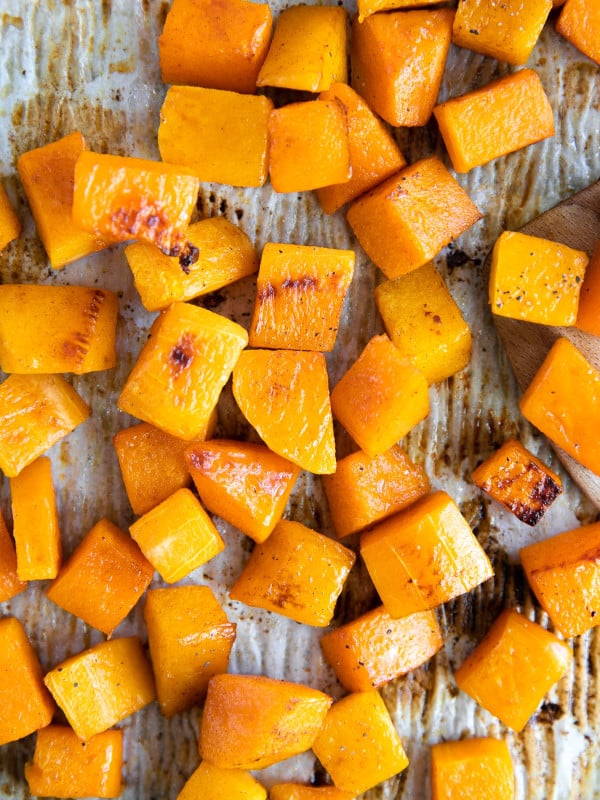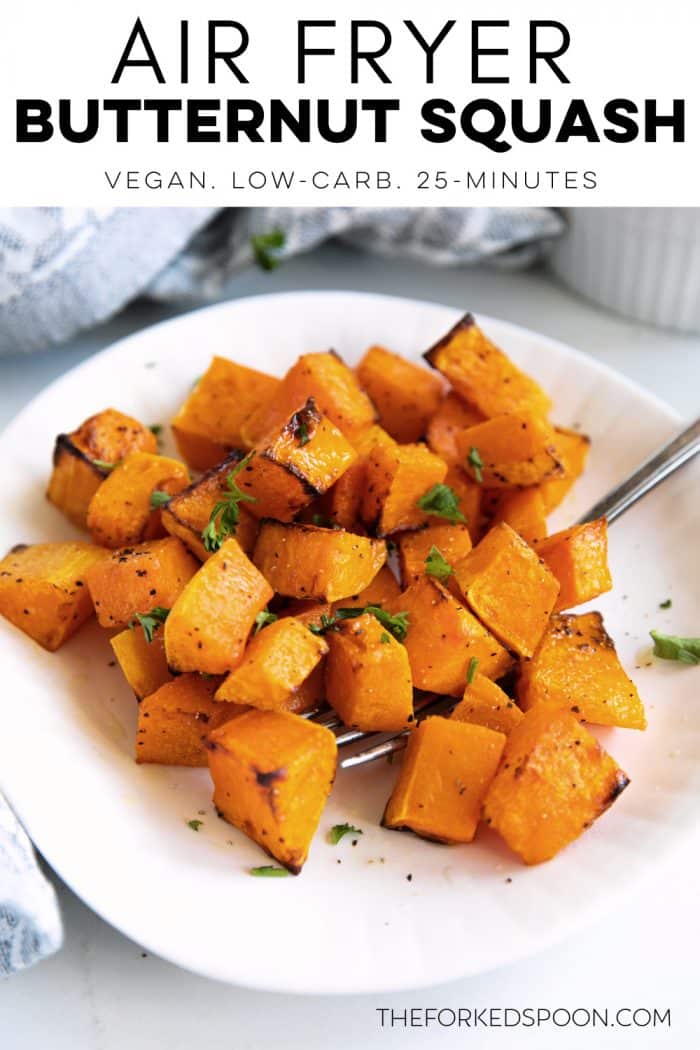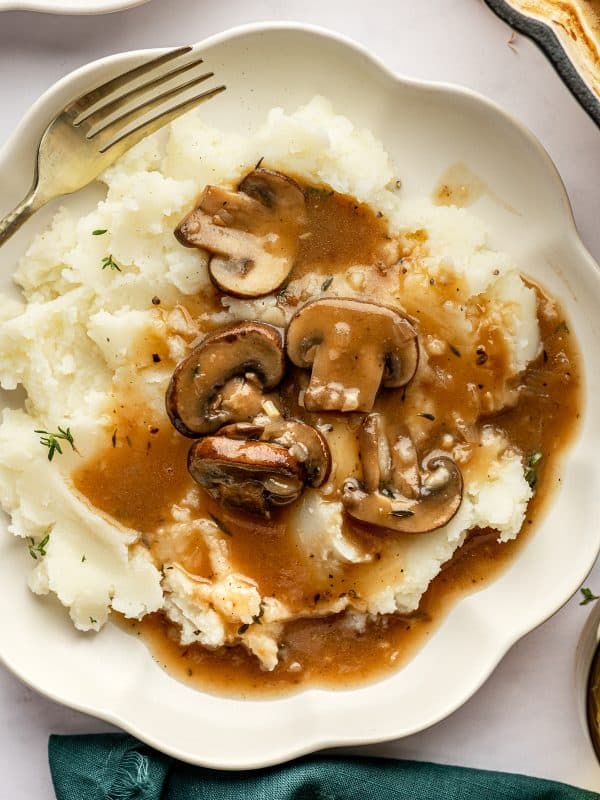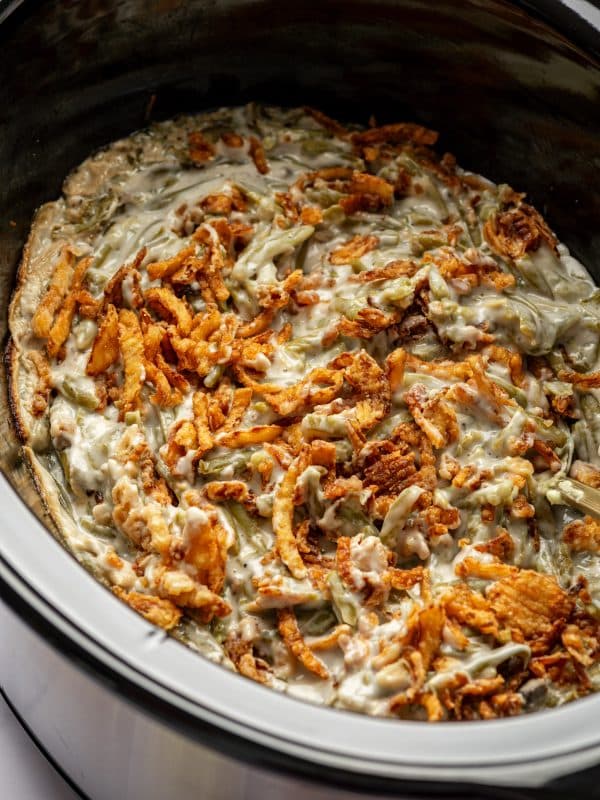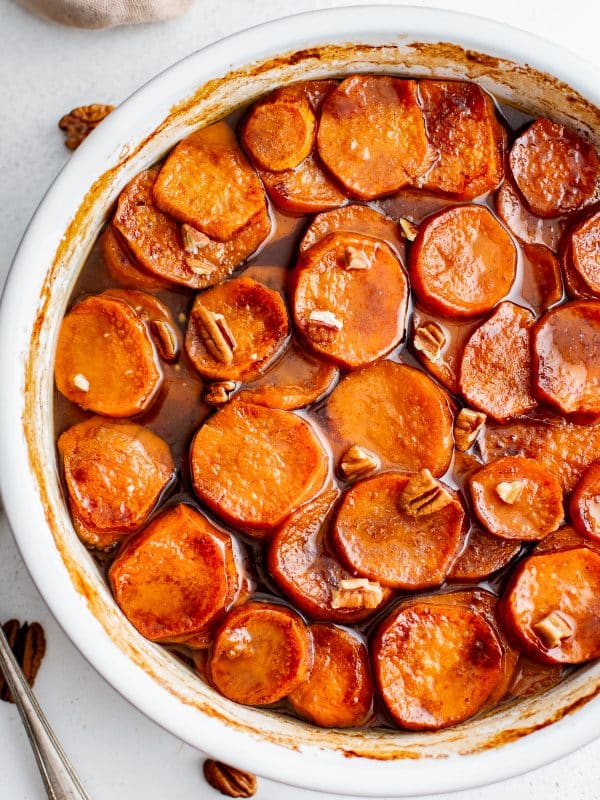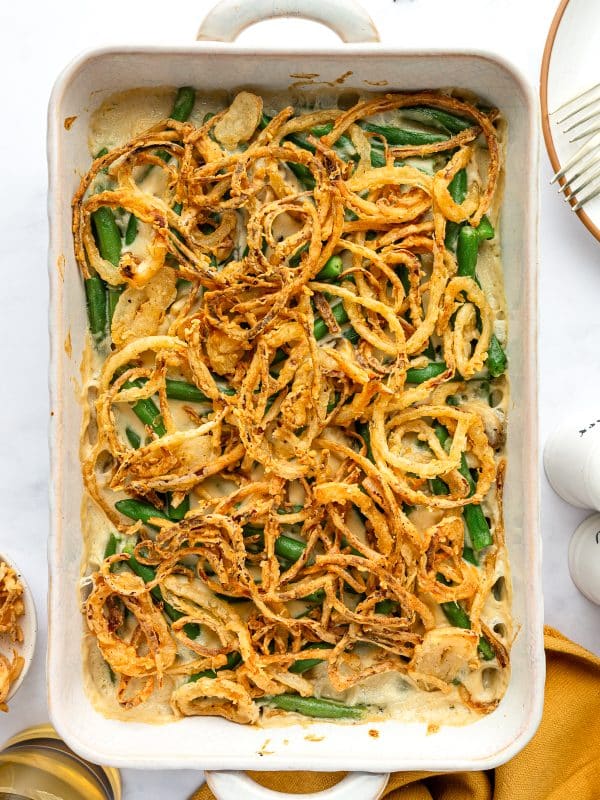This post may contain affiliate links. See my disclosure policy.
Air Fryer Butternut Squash is a quick, easy, and healthy way to make perfectly tender and caramelized butternut squash. Made with less oil and simple seasonings, it’s the perfect fall side dish!
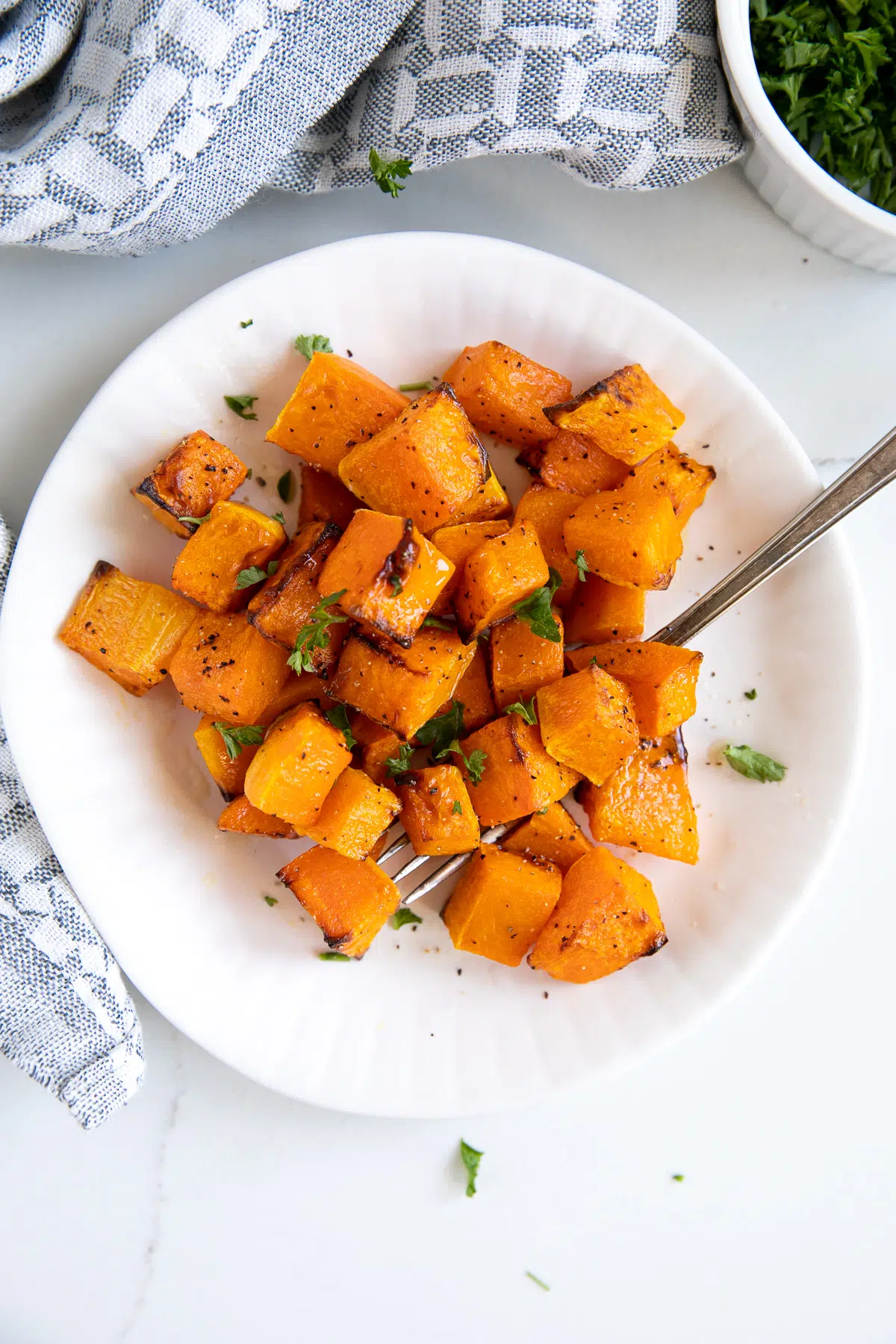
Air Fried Butternut Squash
The air fryer cooks the MOST fabulous veggie side dishes. My favorite of all? Butternut squash.
This air fryer butternut squash is very similar to my roasted butternut squash recipe. But cooking butternut squash in the air fryer has one advantage – time. Air fryer’s are basically compact countertop convection ovens, which means they cook food a little faster than conventional ovens. For example, air fried cubed butternut squash takes about 15-20 minutes, versus the 30 or so minutes it would take to roast in the oven.
The result is perfectly tender, golden, and caramelized butternut squash every single time! It’s so good! Serve it as a flavorful fall side dish with roast turkey breast or oven-roasted pork loin, toss it in this butternut squash salad, or add it to these seriously delicious butternut squash tacos.
You can also air fry butternut squash halves! It takes about 30-35 minutes and is perfect for making mashed or pureed butternut squash to use in recipes like my butternut squash mac and cheese or butternut squash lasagna.
Table of Contents
About the Ingredients
You can find the complete list of ingredients and full recipe in the recipe card below.
Butternut Squash: When cooking air fry butternut squash, choose one that is about 2-3 pounds and feels heavy for its size. If you plan to peel and chop your butternut squash into cubes, look for squash with a longer “neck” and smaller bulb. The neck is easier to peel and cube; the bulb, which contains the seeds and stringy bits, is better for roasting halved and scooping.
Oil: Pick an oil that tastes good. I usually grab olive oil or avocado oil.
Seasoning: For this recipe, I seasoned the butternut squash with garlic powder, onion powder, salt, and black pepper. It’s a simple, savory, and delicious, all-purpose seasoning blend that works well for roasted vegetables.
Recipe Variations
- Use a different type of squash: Butternut squash is an undeniable favorite, but you can also roast other types of winter squash in your air fryer, like kabocha squash or delicata squash. The best part? You can leave the skin on (it’s safe to eat and delicious!)
- Try a different seasoning: Sprinkle with a little cinnamon or pumpkin pie spice for warm fall flavors or try seasoning it with a little curry powder or cumin.
- Add a little sweetness: Add a little brown sugar before roasting, or toss your air fried butternut squash with a bit of melted butter and brown sugar just after cooking.

How to Cook Butternut Squash in the Air Fryer
For detailed instructions and the full printable recipe, check out the recipe card below.
- Prepare the butternut squash: Peel and chop your butternut squash into 1-inch cubes. Learn more here: How to pick, peel, and prepare butternut squash.
- Prepare the air fryer: Spray the air fryer basket with non-stick cooking spray and preheat to 400°F (200°C).
- Season: In a large bowl, toss the butternut squash with the olive oil, salt, black pepper, onion powder, and garlic powder until coated.
- Transfer: Arrange the butternut squash in the air fryer basket in a single layer (some overlapping is ok, but avoid overcrowding).
- Air fry: Cook at 400°F (200°C) for 10 minutes, then gently shake the basket to toss the squash. Continue to cook for an additional 5-10 minutes or until the squash is tender and caramelized around the edges.
- For halved squash: Place the squash cut-side down in the basket and cook for 25-35 minutes, or until the flesh is soft and easily pierced with a fork.
How Long Does it Take to Air Fry Butternut Squash
The total cooking time will vary based on several factors including size and shape of your squash, moisture content, air fryer model (I use this COSORI Air Fryer), and desired texture.
- Peeled & Cubed: 15-20 minutes at 400°F, shaking halfway through for even browning
- Halved: 25-35 minutes at 400°F, depending on size and desired softness
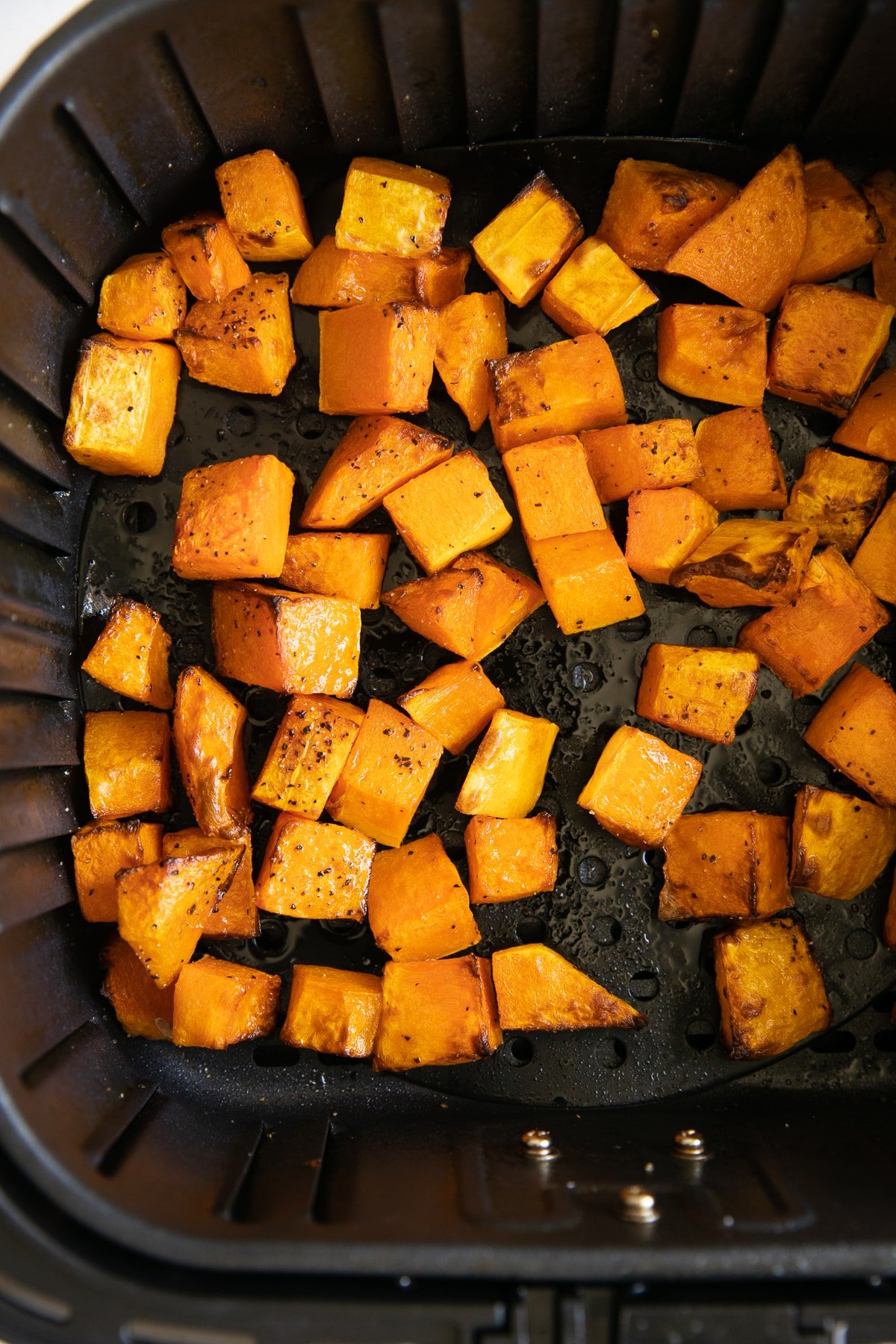
Recipe Tips
- Cut into even pieces: Slice the squash into uniform 1-inch cubes to ensure all of the pieces cook at the same rate.
- Skip the pre-cut squash: Store-bought chopped butternut squash is often uneven in size, which leads to uneven cooking. It also tends to be less fresh, resulting in a mushier texture and milder flavor.
- Shake halfway through cooking: Halfway through cooking, shake the air fryer basket or gently toss the squash to promote even browning and texture.
- Add time for crispier edges: If you prefer more caramelization or crispier edges, simply cook for an extra 2–5 minutes, keeping an eye on doneness to prevent burning.
Storage and Reheating
Transfer the leftover cooled air fryer butternut squash to an airtight container and store it in the refrigerator for 3-4 days.
To reheat, place the squash in a preheated 350°F (175°C) air fryer and reheat for 3-5 minutes, shaking the basket halfway through cooking. You can also reheat them in the oven or microwave at 30-second intervals until reheated.
To freeze leftovers, cool completely then transfer the pieces to a baking sheet lined with parchment paper in a single layer. Freeze for 1-2 hours (this is called flash freezing). Transfer the frozen cubes to a freezer-safe bag or container for up to 3 months. Thaw overnight before reheating or reheat directly from frozen in the air fryer at 375°F (190°C) for 6–8 minutes, or until warmed through and slightly crisp.

Frequently Asked Questions
Technically, yes. However, expect for the squash to be more tender with less caramelized edges. You may also get squash that is chopped unevenly. This can lead to uneven cooking. If you want to air fry frozen butternut squash, consider using it in sauces, purees, or soups like this butternut squash soup recipe or butternut squash risotto.
Technically, no. Butternut squash skin is edible. However, unlike the skin of some other squash varieties, butternut squash skin stays chewy and tough, even after cooking, and can be quite unpleasant to eat.
More Butternut Squash Recipes
Have you tried this air fryer butternut squash recipe? Tell me about it in the comments below! I always love to hear your thoughts. And tag #theforkedspoon on Instagram if you’ve made any of my recipes, I always love to see what you’re cooking in the kitchen.

Air Fryer Butternut Squash Recipe
Ingredients
- 1 medium butternut squash, approx. 2-3 pounds, peeled and cubed into 1-inch pieces
- 2 teaspoon olive oil
- 1 teaspoon salt
- ½ teaspoon black pepper
- ½ teaspoon onion powder,
- ½ teaspoon garlic powder
- Fresh parsley, to garnish, optional
Instructions
- Preheat your air fryer to 400°F (200℃). Spray the inside basket with non-stick cooking spray
- Place the peeled and cubed butternut squash in a large bowl and toss with the olive oil, salt, black pepper, onion powder, and garlic powder.
- Transfer the seasoned squash to the air fryer basket in a single layer.
- Air fry for 10 minutes, then remove the basket and gently shake the basket or toss the squash. Continue to cook for an additional 5-10 minutes or until the squash is tender and caramelized around the edges.
- Season to taste. For sweetness, add a little maple syrup and melted butter, or sprinkle with cinnamon, cayenne (for heat) or fresh minced herbs.
Notes
- As written, this recipe is gluten-free and vegan.
- To air fry halved butternut squash: arrange the halves cut-side down in the basket and cook for 25-35 minutes, or until the flesh is soft and easily pierced with a fork.
- Keep leftovers stored in an airtight container in the refrigerator for up to 4 days or flash freeze and transfer to a freezer-safe bag for up to 3 months. Reheat in the microwave or in your air fryer preheated to 375°F (190°C) for 2-3 minutes (or 6-8 minutes for frozen leftovers).
Nutrition
Nutrition information is automatically calculated, so should only be used as an approximation.


